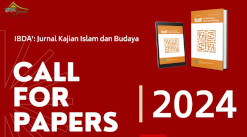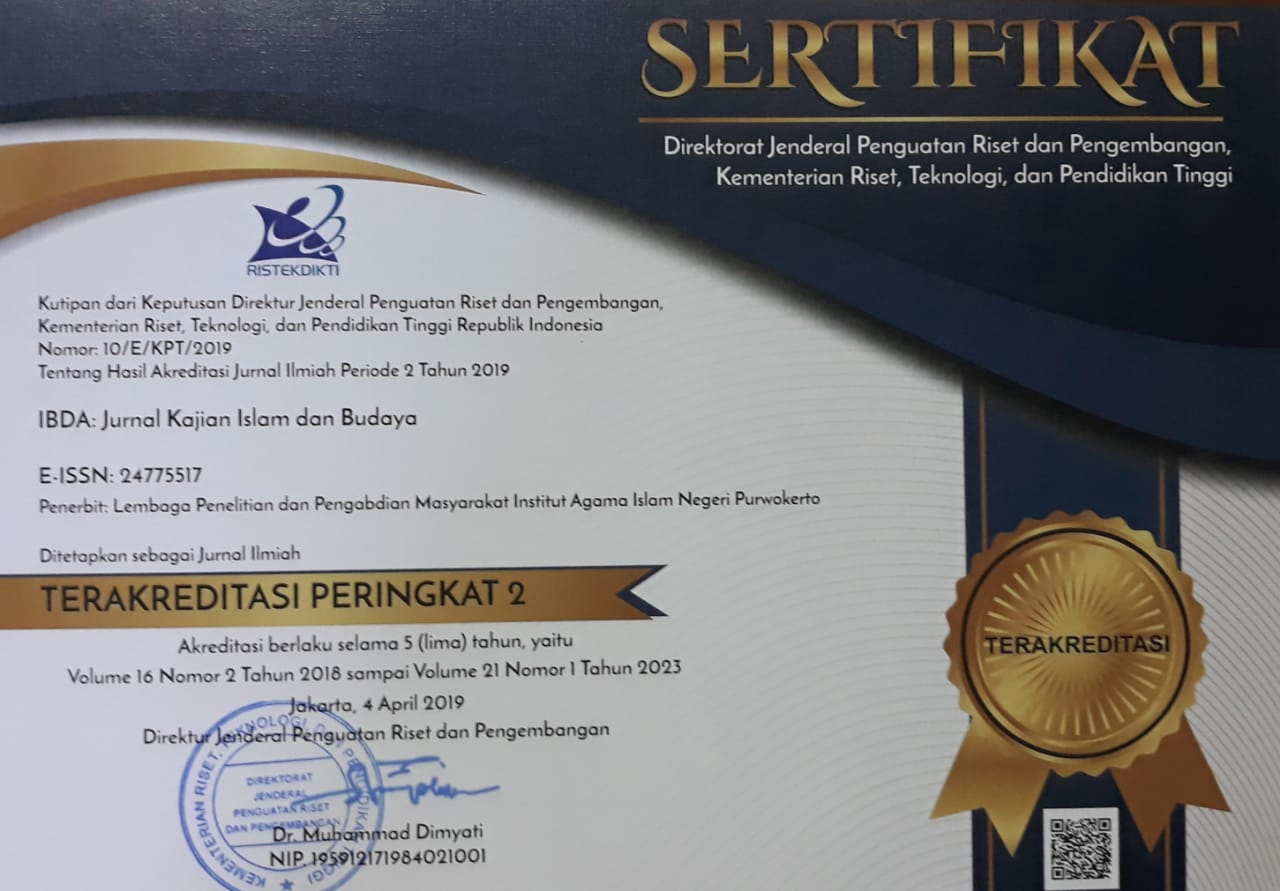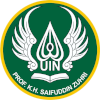MARO TRADITION IN BANYUMAS COMMUNITY
DOI:
https://doi.org/10.24090/ibda.v18i2.3909Keywords:
tradition, maro, Banyumas, agriculture, IslamAbstract
This article discusses the Maro tradition of Banyumas commu- nity, whose existence is endangered by the modernization. Maro is a tradition dealing with agriculture profit share between a landowner and the cultivators by dividing the harvest into two equal parts, half is for the landowner, and the other half is for the cultivator. Maro is commonly applied for dividing the net profit, i.e. the amount of harvest minus the expenses of plantation processes. This tradition enables the low social- economy class to survive as they get the fair benefit for their efforts. The data of this research were collected through interviewing the people en- gaged in the Maro tradition as well as literary studies from previous re- searches related to the topic. This research finds that maro tradition in Banyumas has been popular since the arrival of tarekat in this region. The lands owned by kyai were rented to the cultivators whose payment is given in the form of profit-sharing, called Maro. With such a system, the profit is shared fairly to the cultivators who have done a lot of effort in producing rice. This system meets Islamic values, which emphasize profit sharing based on efforts and work performances. The landowners give freedom to the cultivators, and the net harvest obtained is divided equally between the two parties. Maro system, which was carried out with an oral contract, is considered not to burden the cultivators because of the clear counting system and easy procedures. Social solidarity is also formed in this tradition, it employs people to help the planting and harvesting process, called sambatan.Downloads
Download data is not yet available.
References
Eliade, Mircea. 2002. Mitos Gerakan Kembali Yang Abadi: Kosmos dan Sejarah (The Myth of the Eternal or Cosmos and History) translated by Cuk Ananta. Yogyakarta: Ikon Teralitera.
Geertz, Clifford. 1992. Tafsir Kebudayaan. Yogyakarta: Kanisius.
Jenks, Chris. 1993. Culture: Studi Kebudayaan. Yogyakarta: Pustaka Pelajar.
Kontjaraningrat. 1977. Beberapa Pokok Antropologi Sosial. Yogyakarta: Dian Rakyat.
Lévi-Strauss, Claude. 2005. Antropologi Struktural (Anthropologie Structurale) diterj. oleh Ninik Rochani Sjams. Yogyakarta: Kreasi Wacana.
Sutrisno, Mudji. 2009. Ranah-ranah Kebudayaan. Yogyakarta: Kanisius.
Subiantoro, Slamet. 2010. Antropologi Seni Rupa: Teori, Metode & Contoh Telaah Analitis. Surakarta: UNS Press.
Undang-Undang Republik Indonesia Nomor 2 Tahun 1960 tentang Perjanjian Bagi Hasil.
Interview with Sukiran on 16 Januari 2020 in Purwokerto. He is a land owner the who made his land produce by maro tradition.
Interview with Tarwan on 2 Februari 2020 in Purwokerto. He is a cultivator who manage the production of rice with maro tradition.
Interview with Sardi on 4 Februari 2020 in Purwokerto. He is a cultivator who manage the production of rice with maro tradition.
Geertz, Clifford. 1992. Tafsir Kebudayaan. Yogyakarta: Kanisius.
Jenks, Chris. 1993. Culture: Studi Kebudayaan. Yogyakarta: Pustaka Pelajar.
Kontjaraningrat. 1977. Beberapa Pokok Antropologi Sosial. Yogyakarta: Dian Rakyat.
Lévi-Strauss, Claude. 2005. Antropologi Struktural (Anthropologie Structurale) diterj. oleh Ninik Rochani Sjams. Yogyakarta: Kreasi Wacana.
Sutrisno, Mudji. 2009. Ranah-ranah Kebudayaan. Yogyakarta: Kanisius.
Subiantoro, Slamet. 2010. Antropologi Seni Rupa: Teori, Metode & Contoh Telaah Analitis. Surakarta: UNS Press.
Undang-Undang Republik Indonesia Nomor 2 Tahun 1960 tentang Perjanjian Bagi Hasil.
Interview with Sukiran on 16 Januari 2020 in Purwokerto. He is a land owner the who made his land produce by maro tradition.
Interview with Tarwan on 2 Februari 2020 in Purwokerto. He is a cultivator who manage the production of rice with maro tradition.
Interview with Sardi on 4 Februari 2020 in Purwokerto. He is a cultivator who manage the production of rice with maro tradition.
Downloads
Published
2020-11-18
How to Cite
Hadi, R. (2020). MARO TRADITION IN BANYUMAS COMMUNITY. IBDA` : Jurnal Kajian Islam Dan Budaya, 18(2), 257–270. https://doi.org/10.24090/ibda.v18i2.3909
Issue
Section
Articles
License
Authors who publish with this journal agree to the following terms:
- Authors retain copyright and grant the journal right of first publication with the work simultaneously licensed under a Creative Commons Attribution-ShareAlike License a that allows others to share the work with an acknowledgement of the work's authorship and initial publication in this journal.
- Authors are able to enter into separate, additional contractual arrangements for the non-exclusive distribution of the journal's published version of the work (e.g., post it to an institutional repository or publish it in a book), with an acknowledgment of its initial publication in this journal.
- Authors are permitted and encouraged to post their work online (e.g., in institutional repositories or on their website) before and during the submission process, as it can lead to productive exchanges, as well as earlier and greater citation of published work (See The Effect of Open Access).

















